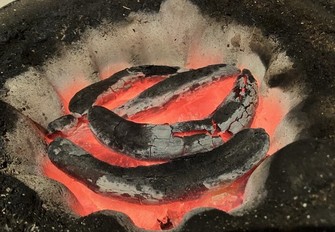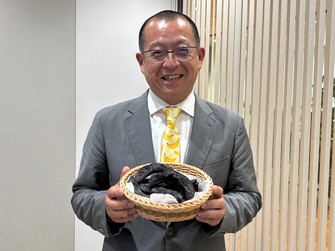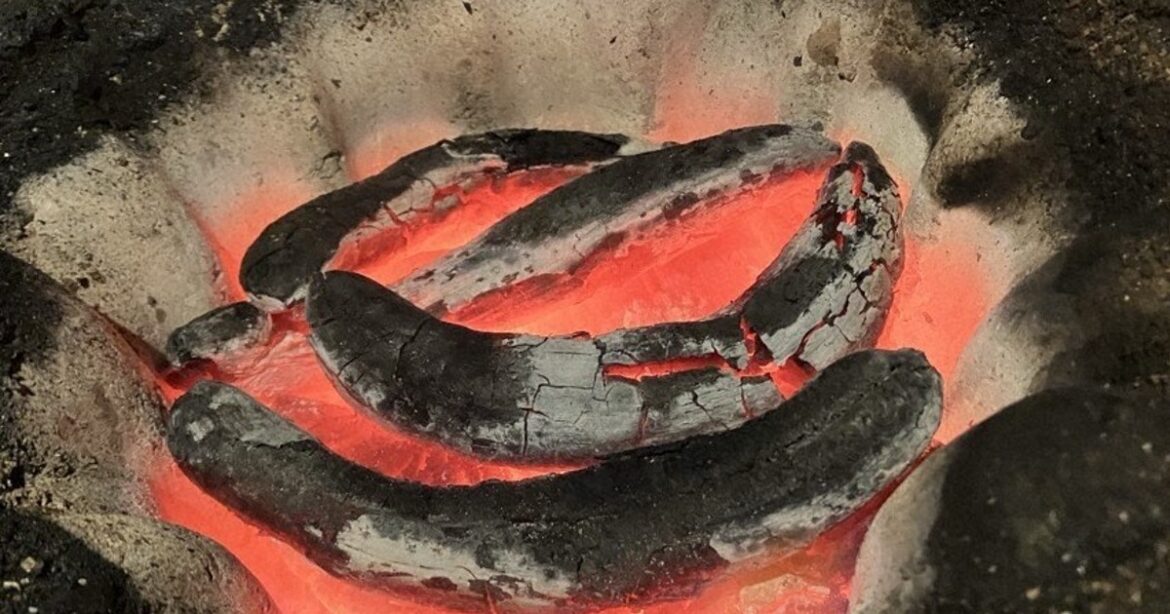
Burning banana charcoals are seen in this photo provided by Dole Japan Inc.
TOKYO — More than 60 companies in Japan are utilizing imperfect bananas, which would otherwise be discarded, to combat food waste. Fruit and vegetable producer and vendor Dole Japan Inc., the initiative’s leader, has now added “banana charcoal” to the lineup.
The latest product has gained attention not only for its visual impact but also for the easy use of charcoal and its wide range of applications in other items.
Japan imports approximately 1 million metric tons of bananas annually. According to Dole Japan, which handles between 200,000 and 250,000 tons of bananas a year, around 20,000 tons get thrown out in landfills annually in the Philippines, a major banana producer, due to not meeting market standards. Blemishes on peels, being too small or too large or having irregular shapes are among some of the reasons.
In addition, bananas typically grow in bunches of 15 to 20, but Japanese supermarkets usually sell them in smaller bunches of four to six. As a result, leftover bananas, even if they meet standards, are sometimes discarded.
In response, Dole Japan launched the “Mottainai Banana” project in 2021. The Japanese term “mottainai” means regrettable wastefulness. More than 60 companies in the confectionery, bakery and other industries have joined, processing imperfect bananas into products such as juice, ice cream and sweets. In fiscal 2024, about 2,000 tons of these bananas were reportedly transformed into such items.
Banana charcoal, newly commercialized by Dole Japan in April, draws inspiration from the practice in the Philippines of carbonizing imperfect bananas for fertilizer. Although its burn time is relatively short at about 30 minutes, it is lighter and easier to ignite than typical charcoal, making it suitable for starting barbecues. It is also easy to break up and dispose of after use, making it user-friendly.

Dole Japan Inc. President Hiroshi Aoki shows banana charcoals in Tokyo’s Chuo Ward in April 2025. (Mainichi/Reina Kamoda)
Retaining the original shape
Despite being pitch black, the charcoal retains the banana’s original shape, giving it a unique appearance. Hiroshi Aoki, president of Dole Japan, stated, “We hope people use banana charcoal during family barbecues or school camps and it prompts them to learn about food waste.”
Banana charcoal has been available in limited quantities on the flea market website Mercari Shops since April 1, priced at 3,300 yen (about $23) for a 2-kilogram box, including tax. Dole Japan is also considering sales at home improvement centers and supermarket chains.
The company also plans to develop new products using banana charcoal, such as toilet deodorizers and T-shirts designed with banana charcoal ink. Aoki, who has tried using banana charcoal on a home grill, noted, “You can light the charcoals using about one-third of the usual amount of fire starter.”
Applications in food industry
Starbucks Coffee Japan offered limited-time items in 2024 featuring Mottainai Bananas, including Banana Brulee Frappuccino, rice flour banana muffins and rice flour banana Swiss rolls.
In addition, Dole Japan is also promoting the “Office de Dole” initiative, which delivers Mottainai Bananas to companies to support employees’ healthy habits while reducing food waste. Currently, about 60 businesses participate in regular purchases. Itochu Techno-Solutions Corp. began distributing some 2,000 bananas monthly to its Tokyo headquarters staff starting May 13.
(Japanese original by Reina Kamoda, Business News Department)


AloJapan.com